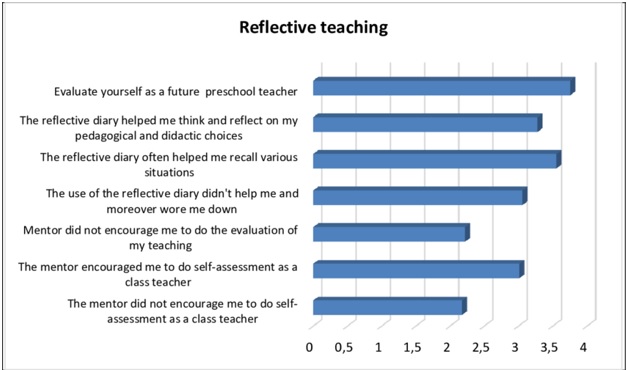Teaching is one of the most demanding and competitive professions. To thrive in the teaching profession, teachers needs to find a way to keep themselves updated with the latest teaching trends and teaching methodologies.
There’s one of the best teaching methods which can help teachers to improve their teaching performance significantly is reflective teaching. The reflective teaching method involves purposeful reflection, self-observation, and self-evaluation which will help them to improve their teaching performance in the classroom significantly.
According to researchgate.net, we can see how different reflective teaching activities can help teachers improve their teaching skills further.

Source: researchgate.net
In this blog post, we will get to explore about reflective teaching method in-depth, its importance, effects, and various reflective activities that every teacher can implement to improve their teaching performance.
Before moving to the topic, can we ask you a question? Do you follow us on Social Media? We regularly share upgraded educational content, tips, feedback, and more. Check us out by clicking the profiles here - Facebook / Twitter / LinkedIn / Pinterest / Instagram / YouTube
So, without any further delay, let’s get started.
What is Reflective Teaching?
Reflective teaching practice in teaching means that teacher gets involved in self-observation and evaluation of their teaching method and overall performance. It helps teachers to learn continuously and it plays a crucial element in the professional development of teachers.
Those who are reflective teachers always think about how they can improve the classroom experience for their students, their teaching method and regularly evaluate their teaching effectiveness. By engaging in reflective practices, teachers can challenge their own teaching-related principles and beliefs help them to grow and develop their teaching careers further.
Importance of Reflective Teaching Method for Teachers
Reflective teaching methods are beyond just simply teaching lessons to students. Below we have shared some of the importance of reflection practice in the teaching profession
- By reflecting on teaching practice, teachers will get to know what’s working for them and what’s not.
- It will teachers to become self-aware and help them to grow professionally.
- According to many research, self-reflection is necessary for teachers to improve their teaching.
- Reflective teaching also helps teachers to adapt with time and student’s learning needs.
Additionally, a reflective teaching culture is also valuable for schools to adapt to any sudden changes in the education industry. For example- Recently, during the pandemic of COVID-19, those teachers who are reflective practitioners were better able to adapt to those situations than general teachers.
Impact of Reflective Teaching on Student Learning & Teaching Experience
The practice of reflective teaching methods in school not only benefits teachers but also the entire school community. It sets a culture in school that continuous learning is equally important for both teachers and students, which fosters a culture of continuous improvement by learning.
The reflective practice among teachers also promotes collaboration between every teacher in the school and supports each other to improve teaching techniques further. This collaborative environment can result in a more productive work environment in school.
Moreover, Prof. John Hattie who’s a well-known educator also mentioned that the impact of reflective teaching on student learning is huge. Reflective teaching method significantly improves the student’s academic performance.
Benefits of Reflective Teaching For Early Childhood Education
Practicing reflective teaching methods offers various benefits for professional and personal growth and with that, it also benefits young learners as well. Here are five key benefits for early childhood education and professional development:
1. Helps in Professional Development
Reflective teaching practice helps the teachers to take charge of their professional development on their own. This empowers them to evaluate their method of teaching which supports them in succeeding in their teaching profession with full confidence.
2. Staying Updated With The Trends
Through reflective teaching practices, teachers can be able to cater to changing education trends and always find fresh and innovative teaching ideas and methods according to demand. This will make the teachers relevant all the time irrespective of any change in the trend of learning or teaching.
3. Understanding Learner’s Needs
Reflective teaching practice makes a teacher able to know the ability and learning needs of their students. Teachers can step in their shoes and know what best support they need to provide which can improve their academic performance.
4. Become a Role Model
If teachers are involved in reflective practices then they also inspire their students to continuously learn by becoming reflective learners. By reflecting on their own learning progress, students can be able to know how they can improve further.
5. Cultivate The Culture of Humility
If both teachers and students practice reflection then it will make them humble and be able to recognize their scope of growth and success at the same time. This will help them to improve further by continuous learning.
Effective Reflective Teaching Activities For Teachers
There are various ways that can facilitate reflective practices for teachers. Let’s get to know what are they:
Journaling
Journaling is one reflective practice for teachers. You can consider documenting your experiences, thoughts, and observations related to your teaching. This will help you to evaluate and analyze your teaching techniques to improve further.
Self-Evaluation Survey
You can consider creating a self-evaluation survey that helps you to evaluate your teaching practices. On top of that, you can also consider using student’s feedback as well in the survey. By accumulating both aspects you can be able to understand your strengths and areas of improvement.
Feedback from Peers
You can also consider conducting peer feedback sessions, in which every teacher can give feedback to each other based on their observations and shared lesson plans. This promotes collaboration between teachers and learns from each other strengths.
Researching Actively
Researching is one of the effective reflecting practices. You can research different teaching methods and techniques and their impact on student’s learning journey. This will help you to stay relevant by adapting your teaching method accordingly.
Joining Online Platforms and Forums
You can consider participating or joining any online teaching platforms and forums which is dedicated to reflective teaching. This will allow you to connect and learn from expert educators who have more experience teaching from all over the world.
Reflective Teaching Is The Key For Achieving Success
The reflective teaching method is one of the effective teaching methods that not only enhance teaching effectiveness but it also inspires both teachers and students to become life-long learners. Those teachers, who have pursued courses like Pre and Primary Teacher Training Courses, know the impact of reflective teaching on student learning and how it also helps them in their professional development.
Consider going through all the benefits of reflective teaching for early childhood education and various reflecting practices that you can implement in your teaching process to improve your teaching performance. So consider embracing reflective practice for your professional development and strive for continuous growth as an educator.
We believe education should be accessible for everyone. That’s why we don’t charge for our blogs. Find the right course that will help you in your career with us, contact us at - 1800–212–6400. You can mail us at act@asiancollegeofteachers.com.
Written By : Abhishek
